Disabled
Yet Intact
stories from a life in progress
text and illustrations by Harilyn Rousso
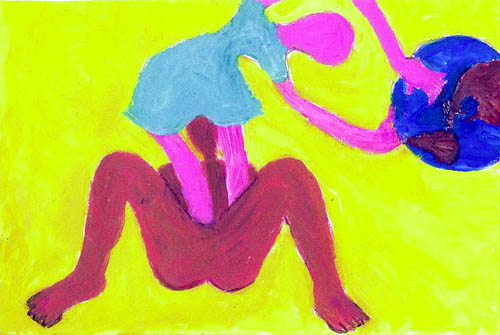
I was in a hurry to be born. When my mother began experiencing intense labor pains, my father whisked her to the hospital, but her doctor had not yet arrived -- he was "en route," a euphemism for nobody knowing where he was. Then, as now, I would wait for no man, and began giving all the telltale signs that I was about to emerge. But the nurses were not having it. They could not allow a birth to occur without the doctor present and he still was nowhere to be found. To keep me under control, the nurses pushed my mother's legs shut, which greatly limited my ability to peak out into the world, not to mention my ability to breathe. My mother reports scratching and biting the nurses, fearful that their delaying tactics were not good for my health. She was right, of course, but that would not be known for some time. My mother complained bitterly to the doctor when he finally arrived, but he insisted no harm had been done. And in fact, I appeared quite all right when I was allowed to be born, a large and seemingly sturdy baby with a full head of dark brown hair.
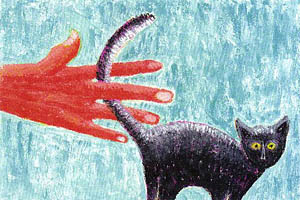 My eagerness to embrace the world continued throughout my infancy, for I was a very curious baby. Yet I was slow to crawl and walk, and my eye-hand coordination left a lot to be desired. The visits to specialists began early. My mother's own doctor was convinced she was neurotic, imagining delays where there were none, but my mother persisted. She heard more than her share of double talk from doctors, including from one so-called pediatric expert, who after seeing me for a few minutes when I was nine months old, was fully convinced that I had a hole in my head and should be immediately institutionalized. It was my good fortune that my mother paid him no mind. She knew something was wrong, but not that wrong. It was not until I was three years old that the accurate diagnosis emerged: cerebral palsy as the result of insufficient oxygen at birth. There had been damage to the part of my brain affecting coordination and motor control. My disability was relatively mild, and the diagnosing doctor advised my mother to raise me as a "normal" child, but no one in my family had ever been accused of being normal, and I was not going to be the first.
My eagerness to embrace the world continued throughout my infancy, for I was a very curious baby. Yet I was slow to crawl and walk, and my eye-hand coordination left a lot to be desired. The visits to specialists began early. My mother's own doctor was convinced she was neurotic, imagining delays where there were none, but my mother persisted. She heard more than her share of double talk from doctors, including from one so-called pediatric expert, who after seeing me for a few minutes when I was nine months old, was fully convinced that I had a hole in my head and should be immediately institutionalized. It was my good fortune that my mother paid him no mind. She knew something was wrong, but not that wrong. It was not until I was three years old that the accurate diagnosis emerged: cerebral palsy as the result of insufficient oxygen at birth. There had been damage to the part of my brain affecting coordination and motor control. My disability was relatively mild, and the diagnosing doctor advised my mother to raise me as a "normal" child, but no one in my family had ever been accused of being normal, and I was not going to be the first.
I am grateful for the delayed diagnosis; it allowed the family legend about my birth to take hold. My mother repeated the story of my impatience to be born hundreds of times throughout her life, never with regret, only with pride. She would not let on until I was fully grown how guilty she felt about my birth trauma, guilt that was clearly unwarranted. Actually, by biting and scratching those nurses, she began her career as my advocate even before I was born. I, in turn, learned how to bite and scratch on my own behalf, and for others. I never allow myself to think of how I must have felt when I was nearly suffocated just at the moment of emergence. Or how my life might have been transformed had I been in less of a hurry. I think most about my determination to be born and to claim my place in the world. It is an image of a doer and an activist, never a victim. Yet at times it has been a difficult legacy.
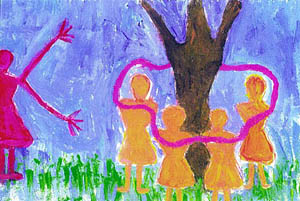 I remember when I was five years old, moving to a new home in Queens. It was my parents' first house on a tree-lined street, two stories high and a backyard with swings and wormy peach tree. Family pictures show me as a cute five-year-old with a pixie haircut and a winning smile. But there was no question that I walked and talked funny. My legs and toes turned in, causing me to trip over my own feet with regularity; my speech, though comprehensible, was slurred, suggesting sleepiness or drunkenness, depending on your perspective. The day my family moved in, I sat on the curb on one side of the street, and the six neighborhood children my age sat on the other side of the street, just staring. One little girl began giggling and whispering to the girl next to her, pointing to my ugly brown high-ankled shoes with heavy laces that seemed more suitable for boys than girls. Later, another girl, Sally, crossed the street and said to me: "I'll be your friend. The other kids won't want to be friends with you. You're crippled." "No thanks, I can make lots of friends," I said with a sense of assurance that I sometimes envy today. At that age, I didn't feel all that different, much less "crippled." I knew I moved clumsily, but that was just the way I was since birth. After all, my legs got me where I wanted to go, and I could play ball and hopscotch, albeit in my own way. And I loved chocolate ice cream cones and Coca Cola like other kids. So why were they all staring?
I remember when I was five years old, moving to a new home in Queens. It was my parents' first house on a tree-lined street, two stories high and a backyard with swings and wormy peach tree. Family pictures show me as a cute five-year-old with a pixie haircut and a winning smile. But there was no question that I walked and talked funny. My legs and toes turned in, causing me to trip over my own feet with regularity; my speech, though comprehensible, was slurred, suggesting sleepiness or drunkenness, depending on your perspective. The day my family moved in, I sat on the curb on one side of the street, and the six neighborhood children my age sat on the other side of the street, just staring. One little girl began giggling and whispering to the girl next to her, pointing to my ugly brown high-ankled shoes with heavy laces that seemed more suitable for boys than girls. Later, another girl, Sally, crossed the street and said to me: "I'll be your friend. The other kids won't want to be friends with you. You're crippled." "No thanks, I can make lots of friends," I said with a sense of assurance that I sometimes envy today. At that age, I didn't feel all that different, much less "crippled." I knew I moved clumsily, but that was just the way I was since birth. After all, my legs got me where I wanted to go, and I could play ball and hopscotch, albeit in my own way. And I loved chocolate ice cream cones and Coca Cola like other kids. So why were they all staring?
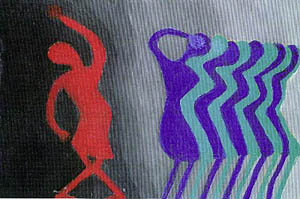 It had not occurred to me to retreat to the house, although now as an adult with many more battle scars from being eyeballed, the lure of the womb is much stronger. Besides, if I had gone inside, my mother would have given me a reassuring hug and sent me out again to face the world. She thought I could cope, and so I did.
It had not occurred to me to retreat to the house, although now as an adult with many more battle scars from being eyeballed, the lure of the womb is much stronger. Besides, if I had gone inside, my mother would have given me a reassuring hug and sent me out again to face the world. She thought I could cope, and so I did.
It took several days of participating in staring contests and answering piercing questions before the other kids got used to how I looked and invited me to play.
"What's wrong with you? Why do you walk that way?"
"I was born that way."
"But why? Is it catching?"
"I was in a hurry to be born but the doctor wasn't ready so the nurses tried to stop me and they hurt my brain, but they couldn't stop me and here I am. And no, you can't catch it."
"Oh, O.K."
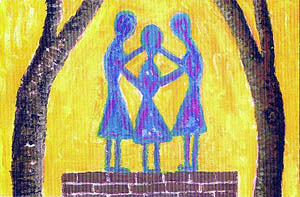 Some of those encounters seemed to last forever. I couldn't help wishing I were more like my older, nondisabled sister who seemed to find her place right away, although later she confessed it was not that easy for her to make friends either. Lucky for me, I was a good hide-and-seek player -- I could sniff out those playmates who were most concealed. Later on, I became a dynamite punch ball player, despite my discombobulated way of running around the bases. Sally did become one of my best friends, but it was the result of choice, not default. We spent many an afternoon playing on those backyard swings, guessing which peach from the nearby tree harbored a worm.
Some of those encounters seemed to last forever. I couldn't help wishing I were more like my older, nondisabled sister who seemed to find her place right away, although later she confessed it was not that easy for her to make friends either. Lucky for me, I was a good hide-and-seek player -- I could sniff out those playmates who were most concealed. Later on, I became a dynamite punch ball player, despite my discombobulated way of running around the bases. Sally did become one of my best friends, but it was the result of choice, not default. We spent many an afternoon playing on those backyard swings, guessing which peach from the nearby tree harbored a worm.
In my life since this trial at age five, I have engaged in many other struggles to enter new territories, to be born and reborn, not all with such successful outcomes. On more than one occasion, I have built womblike structures around me as protection against unwelcoming strangers who say it is not my time to emerge. But images of my insistence and persistence on the day of my birth, and of my mother's scratching and biting on my behalf, keep reappearing in my mind, and invariably a fist emerges from behind the womb opening, no matter how small.
please email ducts with your comments.